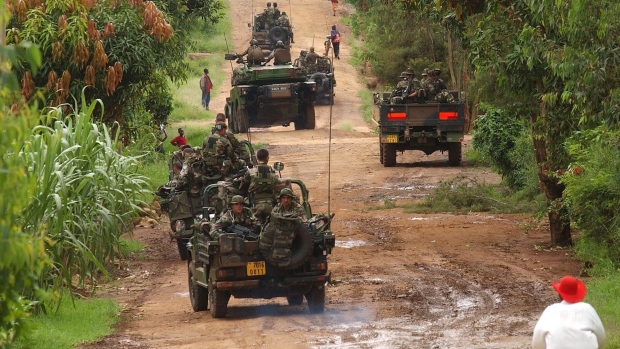Dec 12, 2019
Switzerland Investigates Metal Trader Over Congo-War Allegations
, Bloomberg News

(Bloomberg) -- Sign up to our Next Africa newsletter and follow Bloomberg Africa on Twitter
Swiss prosecutors are investigating a trader of one of the world’s most sought-after-minerals over allegations he illegally dealt in metals during the Democratic Republic of Congo’s civil war.
It’s the first time the Swiss authorities have confirmed the probe that began in March 2018.
The Swiss are scrutinizing earlier allegations that the trader, Christoph Huber, was involved in the illegal trade of minerals during the Congo conflict two decades ago, a spokesman for the Swiss Federal Prosecutor’s Office said by email. Two non-governmental organizations -- TRIAL International and the Open Society Justice Initiative -- filed a criminal complaint against Huber to the Office of the Attorney General in late 2016, the groups said.
Huber, a Swiss national based in South Africa, didn’t respond to multiple emails and calls requesting comment. He hasn’t commented publicly on the allegations or the ongoing investigation and hasn’t been charged with anything.
The prosecutor’s office can’t predict the outcome of the probe, a spokeswoman said in an emailed response to questions on Nov. 28.
Congo was torn apart from 1998 to 2003, when Rwanda and Uganda backed different rebel groups in efforts to depose the nation’s government. United Nations investigations found that the invading armies profited from the illicit extraction and sale of Congo’s coltan, diamonds, gold and other minerals during the war, in which millions of people died.
UN Investigation
A 2009 investigation by the UN found Huber was “involved in the large-scale transport of coltan out of the Democratic Republic of the Congo and Rwanda” when RCD-Goma, a Rwanda-backed armed group, occupied much of eastern Congo during the war. The rebel administration also authorized a contract struck by one of Huber’s companies for Congolese cassiterite concessions, according to a decree signed by the militia in March 2001 and submitted to the prosecutor by Geneva-based TRIAL and the New York-headquartered OSJI.
Tantalum, extracted from coltan ore, is a key component of everyday electronic devices like smartphones and laptops, while tin comes from cassiterite.
About a decade ago, concerns that some traders were operating in an unregulated industry and bankrolling militias and national armies in central Africa’s Great Lakes region -- which by then had become the origin of most of the world’s coltan -- helped spawn the Dodd-Frank Act in the U.S., the largest consumer of tantalum products. The law and other initiatives sought to ensure that the trade in tantalum, tin, tungsten and gold should no longer contribute to the cycle of violence in eastern Congo, where hundreds of militias continue to terrorize the local population.
TRIAL and the OSJI filed a criminal complaint against Huber with the Swiss Prosecutor’s Office along with “numerous pieces of first-hand evidence” in November 2016, the groups said in a joint statement. TRIAL and OSJI uncovered evidence of Huber’s “direct business relationship” with RCD-Goma, they said.
“The Swiss are to be applauded for taking on the hard work of pursuing this complex and important case,” the groups said.
To contact the reporter on this story: William Clowes in Abuja at wclowes@bloomberg.net
To contact the editors responsible for this story: Anthony Osae-Brown at aosaebrown2@bloomberg.net, Paul Richardson, Jacqueline Mackenzie
©2019 Bloomberg L.P.





